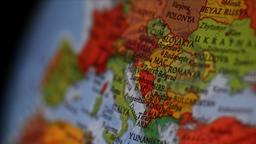
The state of affairs in this region appears to be dominated by a lack of mutual trust which reflects on their policies. The EU officials on various occasions, directly or indirectly, keep referring to certain “concerns” regarding Türkiye in this geography.
What could be possible causes of this conduct? Perhaps one could surmise that historical roots would be one reason. Another may be frequent allusions by some of our politician’s to the glorious “Ottoman” past and their “big brother” attitude. Even though these references are mostly for domestic political consumption, it seems not to alleviate EU’s assumptions. So much so that the European Union, pursuing a policy of domination in this geography, strives to employ it to its advantage.
However, it should be reminded that the Turkish heritage in the Balkans date back to the 14th century. In fact the Ottoman Empire initially flourished and developed as a Balkan state. Five centuries of coexistence came to a sad end when the Ottomans withdrew from the region at the beginning of the last century. Millions of Ottoman Muslims have either lost their lives or were forced out of their ancestral lands. (*)
During turbulent times the newly formed structures struggled to function as independent states until the Second World War. Unfortunately, in due course all of them, except Türkiye and Greece, lost their independence. They became part of the Eastern Bloc, under the domination of Moscow. This situation lasted for half a century. (*Justin McCarthy ”Death and Exile-The Ethnic Cleansing of the Ottoman Muslims, 1821-1922)
In the meanwhile, the historical and cultural ties of the Turks, continued with Balkan peoples, albeit in a more limited fashion, well after the Ottoman rule. Following the collapse of the bipolar world order after the fall of the Berlin Wall and the disintegration of Yugoslavia, seven new states emerged in the Balkan geography.
Today, the number of our kin in the Balkans are quite sizeable. One must also remember that at this geography, each country have minorities in each other. Their borders are still disputed, still carrying the risk of returning back to those troubled days. The internal and external provocations continue, especially in the face of the developments stemming from Russia’s unprovoked attack on Ukraine. This in turn carries the risk of turning into a wider conflict.
However, it surprising that the European Union is not on the same wave length with Türkiye’s presence in the Balkans. It is also worrying that this is gradually manifesting itself as an undeclared EU policy. One should recall that Türkiye has taken part at the various multilateral talks and forums right from the independence of these countries, assisting and formulating peaceful solutions in this problematic political geography. It has shared its affinity and understanding of regional sentiments with EU and the international community.
In turn the EU has come up with a definition of "Western Balkans" a term which appears to be coined to politically exclude Türkiye from the region. This is perhaps a result of their perplexing concerns. This manifestation reflects a possible intention to keep Türkiye out of the area, even if all the countries presently in the EU waiting room join. Isn’t this a sign that the EU decision makers cannot accept Türkiye to take initiatives in the Balkans?
Furthermore, during various discussions within the EU, it is frequently pointed out that Türkiye, as well as Russia and China are benefitting from the EU’s somewhat inability to develop its relations with the Balkan countries. The alleged increase of Turkish influence mostly in Albania, Bosnia, Kosovo and Macedonia is also another reason for them to complain. Some examples of EU’s approach are; Austria has spoken out loud that the EU's rivals in the Balkans are Türkiye, Russia and China. Later, France, similarly, defined the “Western Balkans” as a geopolitical risk, claiming that Türkiye, Russia and China were carrying out smear campaigns in Africa by describing France as a neo-colonialist. Donald Tusk, President of the European Council, (2014-2019) at the joint press conference with than Prime Minister Edi Rama on the Albanian leg of the Balkan tour, went as far as to say that "You will achieve success like İskender Bey, who kept the Ottomans away from Europe".
However, the question here is does EU really understand the Balkan sensitivities, or make an effort to understand it. EU decision makers ignore the fact that the Turkiye’s relationship with the Balkan countries not only stem from a shared history, but of coexistence, linguistic, religious and cultural ties and a deep sense of kinship. On the other hand, there is also a perceived threat of radical Islam which connotes islamophobia.
Consequently, these developments have negative effect on the Turkish public opinion. Whereas the EU officials repeat on different occasions that "There are basically no obstacles for the Turks at the EU gates, they will be as European as they want". This actually does not mean much when it comes to practice. Meanwhile, Türkiye’s relations with Russia, developments regarding Russian natural gas and talk of Shanghai Five seem to add to EU’s concerns.
Despite these issues, encouraging developments do exist. Last February I was in Thessaloniki representing TEPAV for the South Eastern Europe (SEE) 2030 Strategy meeting, a joint call for action by all 13 SEE economies. The meetings were held within the framework of the Regional Cooperation Council (RCC) which is an all-inclusive, regionally owned and led cooperation framework. This framework engages RCC participants from the South East Europe (SEE), members of the international community and donors on subjects which are important and of interest to the SEE, with a view to promoting and advancing the European and Euro-Atlantic integration of the region. Through regional cooperation the 2030 Strategy seeks to promote and advance the implementation of UN Sustainable Development Goals within the SEE region. But even there Türkiye has to overcome some biased EU policies. Despite some issues, reconciliation and solidarity in the region are evidently more important for the prosperity and stability of the Balkan countries.
Türkiye with its young dynamic population, intellectual structure and capacity is inalienable part of the Western world. If it is systematically excluded, it would only cause harm not only to the region and SEE economies but elsewhere also. Besides attempts to that end will not shrink or lessen the role of this country neither globally nor regionally, but would narrow opportunities for regional cooperation.
The Balkans provide a good venue for both the EU and Türkiye to cooperate. Türkiye’s FDI’s in the region amount to around 5 billion USD (2019) which has increased over time. According to UNCTAD estimates (2020) Türkiye ranked among the top 10 investors in Albania, Bosnia-Herzegovina, Kosovo and N. Macedonia, and among the top 20 investors in Bulgaria, Montenegro and Croatia. At the regional level Türkiye was among the top 13 investors.
Future is in cooperation for all parties concerned.





